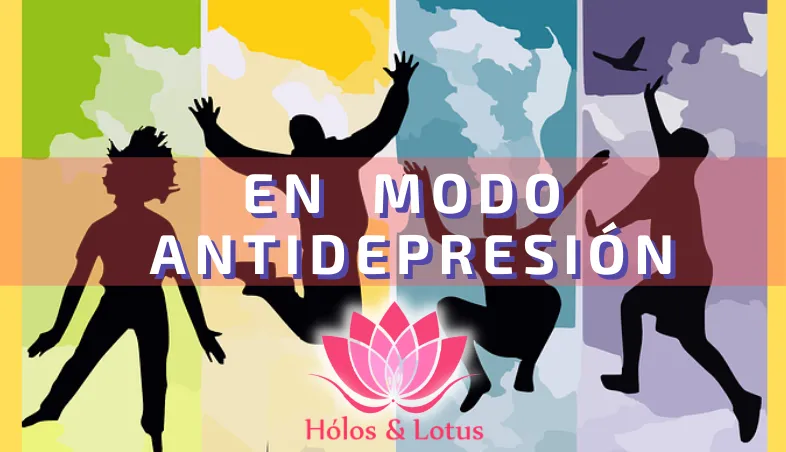“Hay más en la superficie de lo que nuestra mirada alcanza”.
Aaron Beck - psiquiatra estadounidense

Esta es la tercera entrega de la serie sobre la Tríada Cognitiva”, el trío de síntomas más complejo de la depresión: visión negativa sobre sí mismo, sobre el mundo y sobre el futuro.
En esta entrega de su columna “En Modo AntiDepresión” les regalaré parte de mi testimonio con este síntoma y como siempre algunas recomendaciones basadas en mi experiencia y a la luz de expertos en salud mental.

Cuando se me diagnostica con depresión clínica mi visión del mundo se volvió más negra. ¿La razón? Incomprensión de parte de familiares y amigos, sentía que tenía algo que me marcaba ante la sociedad, que estaba loco (al inicio tampoco yo mismo comprendía bien todo lo que pasaba). Un complejo de inferioridad y persecución creció en mí, ya lo tenía, ya he conversado con ustedes sobre ello, de mis inseguridades y temores; pero al saberme así mis sentidos se “agudizaron” y percibía que todos me criticaban, me veían mal, que se burlaban.
El mundo y los que lo habitaban literalmente se convirtieron para en mí en una amenaza, confiaba poco en la gente y eso, por supuesto, no hacía fácil mi proceso depresivo.
Algo que también me ocurría era que si veía noticias en los diarios o televisión, sobre todo si eran noticias sobre guerras, desastres naturales o situaciones políticas difíciles en el país todo lo maximizaba, me agobiaba en demasía. Recuerdo que me acontecieron muchos eventos donde “por mi culpa” dañé cosas, producto de mi torpeza y falta de coordinación en algunos momentos, síntomas también de la depresión. Al ocurrirme esos percances, mi sensación de frustración aumentaba, mi visión negativa de mis mismo y del mundo se exacerbaba, fortaleciendo aún más esta tríada cognitiva.


¿CÓMO MEJORAR NUESTRA VISIÓN DEL MUNDO?
Algunas estrategias de tratamiento propuestas por Aaron beck son las siguientes:
🔵Rememorar los pensamientos automáticos. Al momento de ocurrir algo a la persona, se analizan los pensamientos automáticos que originaron este acontecimiento. De igual manera el estado emocional producto de lo acontecido.
🔵Se somete a prueba la objetividad de esos pensamientos automáticos. A través de preguntas de confrontación, el paciente es ayudado para que rechace los pensamientos disfuncionales. Algunas preguntas son: ¿En qué se basa para pensar eso? ¿Qué pruebas tiene para avalar esos pensamientos automáticos? ¿Qué errores en el procesamiento de la información (catastrofismo, generalización, etc.) está desarrollando? Se buscan otras explicaciones posibles.
🔵Determinar los esquemas cognitivos que subyacen bajo los pensamientos automáticos del paciente.
🔵Evaluación de la validez de los esquemas cognitivos. Esta evaluación es similar a la evaluación de la validez de los pensamientos automáticos.
Adaptación de Cogniciones depresivas de Beck

El hecho de que una persona tenga una visión negativa del mundo e interpreta la realidad de manera catastrófica o disfuncional, no indica que necesariamente sufra de depresión, pero definitivamente, una persona con depresión sí sufrirá con casi toda probabilidad de este proceso de pensamientos oscuros y pesimistas. En cualquiera de ambos casos, lo recomendable es buscar ayuda profesional, especialmente un psicólogo o psiquiatra-psicoterapeuta que de herramientas al paciente para confrontar el patrón de pensamientos negativos por una visión más realista del mundo. En mi caso, esto me ayudó en gran manera a enfrentar mejor la depresión e irla superando con más facilidad y eficacia.
Gracias por tu lectura atenta. Espero este artículo haya sido de utilidad para ti. Cualquier opinión, pregunta o sugerencia que pueda aportar valor a este post, será bienvenida en la sección de comentarios.


"There is more on the surface than our gaze can reach".
Aaron Beck - American psychiatrist
This is the third installment in the series on the Cognitive Triad," the most complex trio of symptoms of depression: negative view of self, the world and the future.
In this installment of your column "In AntiDepression Mode " I will regale you with part of my testimony with this symptom and as always some recommendations based on my experience and in light of mental health experts.

When I was diagnosed with clinical depression my view of the world became blacker. The reason? Incomprehension on the part of family and friends, I felt that I had something that marked me before society, that I was crazy (at the beginning I didn't understand everything that was going on either). An inferiority and persecution complex grew in me, I already had it, I have already talked to you about it, about my insecurities and fears; but knowing that I was like that my senses were "sharpened" and I perceived that everyone criticized me, they saw me badly, they made fun of me.
The world and those who inhabited it literally became a threat to me, I had little confidence in people and that, of course, did not make my depressive process easy.
Something that also happened to me was that if I saw news in the newspapers or on television, especially if it was news about wars, natural disasters or difficult political situations in the country, I maximized everything, it overwhelmed me too much. I remember that many events happened to me where "because of me" I damaged things, product of my clumsiness and lack of coordination at times, also symptoms of depression. When these mishaps happened to me, my sense of frustration increased, my negative view of myself and the world was exacerbated, further strengthening this cognitive triad.

Source

HOW TO IMPROVE OUR VIEW OF THE WORLD
Some treatment strategies proposed by Aaron beck are as follows:
🔵 Recalling automatic thoughts. When something happens to the person, the automatic thoughts that originated this event are analyzed. Likewise, the emotional state resulting from the event is analyzed.
🔵 The objectivity of these automatic thoughts is tested. Through confrontational questions, the patient is helped to reject the dysfunctional thoughts. Some questions are: On what basis do you think this? What evidence do you have to support these automatic thoughts? What errors in information processing (catastrophism, generalization, etc.) are you developing? Other possible explanations are sought.
🔵Determine the cognitive schemas underlying the patient's automatic thoughts.
🔵Assess the validity of the cognitive schemas. This assessment is similar to the assessment of the validity of the automatic thoughts.
Beck's Depressive Cognitions Adaptation

The fact that a person has a negative view of the world and interprets reality in a catastrophic or dysfunctional way does not indicate that he or she necessarily suffers from depression, but definitely, a person with depression will almost certainly suffer from this dark and pessimistic thought process. In either case, it is advisable to seek professional help, especially from a psychologist or psychiatrist-psychotherapist who can give the patient tools to confront the negative thought pattern with a more realistic view of the world. In my case, this helped me in a great way to better face my depression and overcome it more easily and effectively.
Thank you for your attentive reading. I hope this article has been useful for you. Any opinion, question or suggestion that can add value to this post, will be welcome in the comments section.
Translated with www.DeepL.com/Translator (free version)


@garybilbao

Las recomendaciones expresadas en este post están basadas en mi experiencia y en las brindadas por expertos en el tema.
The recommendations expressed in this post are based on my experience and those provided by experts in the field. Fuentes consultadas / Sources consulte: IMPORTANTE: Este artículo es meramente informativo. No pretende suprimir las recomendaciones de su terapeuta. Antes de tomar en cuenta o practicar alguna de las ideas aquí expresadas, consulte con su médico o llévelas a la práctica bajo su propia responsabilidad. IMPORTANT: This article is merely informative. It is not intended to suppress the recommendations of your therapist. Before considering or practicing any of the ideas expressed here, consult your doctor or put them into practice at your own risk.
- La tríada Cognitiva de Beck. | - Cogniciones depresivas de Beck



Si quieres ser parte activa de esta comunidad puedes escribir y compartir tu contenido en Holos & Lotus, comentar y apoyar las publicaciones de otros usuarios o realizar delegación de HP a la comunidad. Si deseas más información puedes contactar a @miriannalis, @yonnathang, @chaodietas o @pavanjr.
If you want to be an active part of this community you can write and share your content on Holos & Lotus, comment and support other users' posts or make HP delegations to the community. For more information you can contact @miriannalis, @yonnathang, @chaodietas or @pavanjr

- Banner elaborado en Canva con los elementos disponibles en su versión gratuita / Banner elaborated in Canva with the elements available in its free version.
- Banner de la Comunidad diseñada por la artista berlissanoja / Community Banner designed by artist berlissanoja.
- Logo de la Comunidad elaborado por el diseñador casilokodesign / Community logo designed by designer casilokodesign.


Para más gifs de Hive, pulsa aquí.
